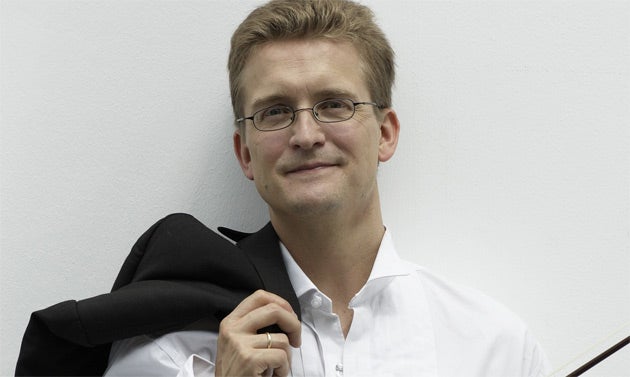Christian Tetzlaff/ Lars Vogt, Wigmore Hall, London

Your support helps us to tell the story
From reproductive rights to climate change to Big Tech, The Independent is on the ground when the story is developing. Whether it's investigating the financials of Elon Musk's pro-Trump PAC or producing our latest documentary, 'The A Word', which shines a light on the American women fighting for reproductive rights, we know how important it is to parse out the facts from the messaging.
At such a critical moment in US history, we need reporters on the ground. Your donation allows us to keep sending journalists to speak to both sides of the story.
The Independent is trusted by Americans across the entire political spectrum. And unlike many other quality news outlets, we choose not to lock Americans out of our reporting and analysis with paywalls. We believe quality journalism should be available to everyone, paid for by those who can afford it.
Your support makes all the difference.The temperature must have risen at least ten degrees during the second half of this Christian Tetzlaff and Lars Vogt programme at Wigmore Hall.
It was pretty cool to begin with: circumspect Bach – the 5th Violin Sonata in F minor – marked, in the first page or two of the opening Largo, by a shade too much vibrato, almost as if Tetzlaff were attempting to warm the music and render it less austere than is customary. It was very 21st century – Tetzlaff playing on his own modern instrument and Vogt luxuriating in Steinway grand amplitude.
There was another thing, too: music on Tetzlaff’s stand. It was a BBC Radio 3 recording, I know, but music always comes between a performer and his audience and beautiful though both players’ responses were to the grand soaring lines of Brahms’ Violin Sonata No.2 in A there was no question that Tetzlaff, in particular, was psychologically – to use actors’ parlance – still “on the book”. With a player as special as this you know instinctively when the technique is not quite connecting with the emotional core of a piece. It was quite simply one of those performances which left you wanting more.
And, boy, did we get more. It could be, of course, that with Bartok’s huge and voracious Violin Sonata No.1 waiting to pounce from the other side of the interval that Tetzlaff and Vogt’s Brahmsian reserve was simply a case of pacing by design – at any rate, the music in this instance may physically have been on the stands but in every other respect it was back in the dressing room. From the very opening page where Tetzlaff seemed quite literally to hurl himself into the foaming rapids of the piano part this was an Allegro appassionato that was in every sense - livid.
The big surprise of this first movement is its nocturnal middle section, tremulous and expectant, a serenade of sorts but so very different from the spare, beautiful theme of the ensuing Adagio where transfiguration is the name of the game. Seeking inspiration in altissimo Tetzlaff seemed to spirit sounds from higher than a dog can hear until the opening theme was festooned in shimmering embellishments.
Both parties then powered into the dizzying finale, Tetzlaff shredding bow hair and Vogt stomping into piano part like his feet not his hands were going to do the business. This was country dancing as a blood sport, a whisker away from grievous bodily harm, sensationally uninhibited You could hardly recognise either player. Until, that is, they politely offered us genial Dvorak as a reassuring encore.
Join our commenting forum
Join thought-provoking conversations, follow other Independent readers and see their replies
Comments